Select Language

By Simon Lewis and Humeyra Pamuk
WASHINGTON (Reuters) - The United States must employ "all the tools at our disposal" to outcompete China, a top U.S. State Department official said on Monday, as the Biden administration unveiled its budget request for the 2025 fiscal year.
The request includes $4 billion over five years in mandatory funding for this purpose, including $2 billion to create a new international infrastructure fund to provide a credible, reliable alternative to Chinese infrastructure funding, Deputy Secretary of State for Management and Resources Rich Verma told a news briefing.
The other $2 billion was earmarked for "game-changing investments" to help Indo-Pacific countries push back against "predatory efforts," he said, adding that those would include efforts to improve governance and the rule of law.
The State Department requested a separate $4 billion in discretionary funding to cover foreign assistance and diplomatic engagement in the region.
U.S. efforts to fund infrastructure in developing countries have long been dwarfed by China's massive Belt and Road Initiative, a 10-year-old project to build infrastructure and energy networks connecting Asia with Africa and Europe through overland and maritime routes.
According to a report by U.S. researchers last November, Chinese financial institutions lent $1.34 trillion to developing countries from 2000 to 2021.
"We must employ all the tools at our disposal to outcompete China, wherever possible," Verma said, also referring to China by the initials of its official name, the People's Republic of China (PRC).
He said the request for fiscal 2025 would allow the U.S. "to continue to invest in the foundations of our strength at home, align with like-minded partners to strengthen our shared interests and address the challenges posed by the PRC, and harness those assets to compete with the PRC and defend our interests."
Verma said the infrastructure fund would support "transformative, quality and sustainable hard infrastructure projects."
At the 2023 G20 Summit in India, U.S. officials said President Joe Biden and Indian Prime Minister Narendra Modi co-hosted a group of G20 leaders to accelerate investments in high-quality infrastructure projects and development of economic corridors through a Partnership for Global Infrastructure and Investment (PGI).
This came after the Group of Seven rich Western countries leaders pledged in 2022 to raise $600 billion in private and public funds over five years to finance needed infrastructure in developing countries and counter the Belt and Road project.
Overseas finance has won Beijing friends across the developing world, while drawing criticism from the West and in some recipient countries, including Sri Lanka and Zambia, that infrastructure projects it funded saddled them with debt they were unable to repay.
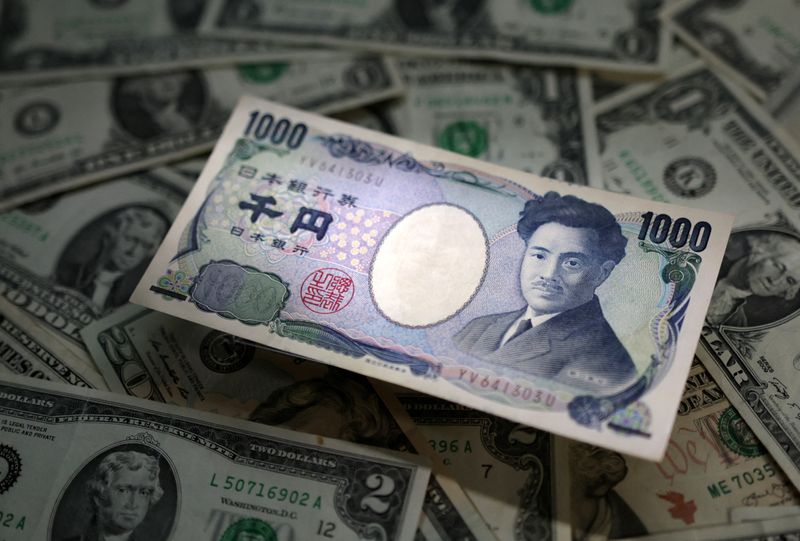
By Gertrude Chavez-Dreyfuss
NEW YORK (Reuters) - The yen drifted higher against the U.S. dollar for a fourth straight session on Monday, bolstered by an upward revision to Japan's growth figures and expectations the Bank of Japan could exit negative rates at its policy meeting next week.
In cryptocurrencies, bitcoin soared to a fresh record high above $72,000 underpinned by a surge in inflows into new spot exchange-traded funds for the digital asset. Hopes that the Federal Reserve will soon cut interest rates have also lifted bitcoin, which was last up 5.3% at $72,033 .
The market though remains focused on the yen and BOJ.
In afternoon trading, the dollar was at 146.94 yen, down 0.1% on the day.
A growing number of BOJ policymakers are warming to the idea of ending negative rates at their March 18-19 meeting, sources told Reuters, amid expectations for hefty pay rises from Japan's biggest firms. Results of this year's annual "shunto" wage negotiations are due on Wednesday.
At the same time, an upward revision to Japan's economic growth last quarter meant the country avoided a technical recession, adding to the argument the economy could weather tighter policy.
"We have gone from focusing on the April meeting for the BOJ to make a rate move to March. But I prefer a policy move in April right now," said Amo Sahota, executive director at FX consulting firm Klarity FX in San Francisco.
"They have been slow to act all this time, so what's the hurry now all of a sudden. We had the GDP revision but there's nothing there that says Japan is about to go explosive in growth and prices that they need to come in really hard right now. I think they have little more capacity to wait."
The dollar index rose 0.2% to 102.85, not far from the nearly two-month low of 102.33 reached on Friday when monthly payrolls figures signalled a cooling U.S. labor market, keeping the Fed on track to ease policy this year. The data did show downward revisions to January's blowout number.
"(Fed Chair Jerome) Powell has said time and time again that the Fed has been looking for softening in the labor market, and it appears Friday's release - though on the surface quite hot - might have shown the cracks necessary to move the needle earlier," said Helen Given, FX trader, at Monex USA in Washington.
Traders currently see June as most likely for the first cut, bets that could be moved by important consumer price index inflation data on Tuesday.
The euro slipped 0.1% to $1.0924 after jumping as high as $1.0980 on Friday for the first time since Jan. 12. The European Central Bank left rates at record highs last Thursday while cautiously laying the ground to lower them later this year.
Sterling dropped 1.1% against the dollar to $1.2807, after pushing to the highest since late July at $1.2890 on Friday amid bets the Bank of England will be slower to cut rates than the Fed or ECB. The British currency faces a test on Tuesday with the release of jobs and wage data.
Investors will be focused on Tuesday's consumer prices index (CPI) report, with the market forecasting headline CPI for February to rise 0.4%, from 0.3% in January, according to a Reuters poll.
Core CPI, on the other hand, is seen at 0.3%, down from 0.4% in January. The year-on-year core CPI, however, is expected to have slipped to 3.7% in February, from 3.9% in the previous month.
"When you look at CPI, you're really thinking about (Fed Chair Jerome) Powell's comments that they just need a little more evidence," said Klarity FX's Sahota. "And even if that evidence is showing that inflation is the same as it has been, then that's good enough for them to feel better conviction that they want to take rates lower."
The Australian dollar was down 0.2% at US$0.6610 after jumping last week as the U.S. dollar fell on the back of the slowdown in the labor market.
(This story has been refiled to add the analyst's name in paragraph 16)

By Chuck Mikolajczak
NEW YORK (Reuters) -A gauge of global stocks retreated for a second straight session on Monday, easing further from a record high ahead of U.S. inflation data this week which could heavily influence the Federal Reserve's interest rate path.
Stocks have hit multiple record highs this year, but declined on Friday following a mixed U.S. payrolls report that did little to alter expectations for the Fed to begin cutting rates in June.
U.S. inflation data is due on Tuesday in the form of the consumer price index (CPI), with expectations for a monthly increase of 0.4% and 3.1% on an annual basis.
The Dow Jones Industrial Average rose 46.97 points, or 0.12%, to 38,769.66. The S&P 500 lost 5.74 points, or 0.11%, at 5,117.95 and the Nasdaq Composite fell 65.84 points, or 0.41%, to 16,019.27.
"There are two ways stocks can get hit here - in the very, very near-term you can get an upside surprise to CPI and you get further inversion of the yield curve and that just kind of punts the eventual reckoning down the street a few blocks," said Brian Nick, senior investment strategist at The Macro Institute in New York.
"But what we're more concerned about is that there's emerging weakness in a lot of the current activity."
U.S. Treasury yields edged up ahead of the data, with the benchmark U.S. 10-year notes up 1 basis point at 4.098%, from 4.088% late on Friday. The 2-year note yield, which typically moves in step with interest rate expectations, rose 5 basis points to 4.536%.
The Fed is scheduled to release its next policy statement on March 20 and investors have all but ruled out a cut, with expectations at 97% the Fed will hold rates steady, according to CME's FedWatch Tool.
Last week, comments from Fed Chair Jerome Powell and European Central Bank policymakers buoyed expectations that rate cuts will begin this summer. Expectations for a cut of at least 25 basis points (bps) at the June meeting are currently above 70%.
MSCI's gauge of stocks across the globe fell 2.55 points, or 0.33%, to 768.75.
The STOXX 600 index closed down 0.35%, while Europe's broad FTSEurofirst 300 index ended down 6.47 points, or 0.32%, weighed down by technology sector declines.
The dollar index gained 0.17% at 102.85, with the euro down 0.12% at $1.0924. Sterling weakened 0.37% at $1.281.
The Japanese yen strengthened 0.09% against the greenback at 146.94 per dollar. The yen had strengthened earlier in the day after Reuters reported a growing number of Bank of Japan policymakers are warming to the idea of ending negative interest rates this month.
In addition, data released on Monday showed Japan was not in recession after economic growth was revised up to an annualized 0.4% for the December quarter.
Crude prices were mixed, as U.S. crude settled down 0.1% at $77.93 a barrel and Brent settled at $82.21 per barrel, up 0.16% to on the day as concerns eased that fighting in the Middle East would disrupt supply and Chinese data suggested weak demand, while an increase in U.S. refining limited any selling.
In cryptocurrencies, bitcoin gained 5.37% at $72,090.50 after hitting a record $72,901.94.
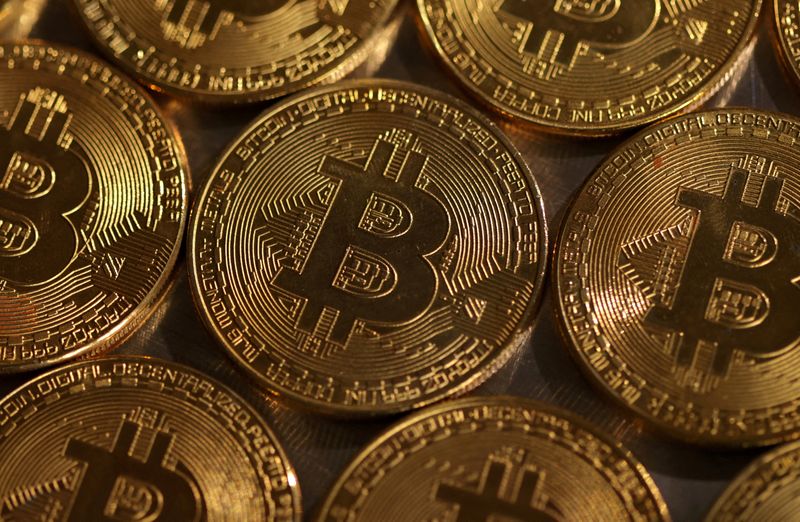
(Reuters) -Bitcoin is back in the headlines, having roared to a new record high, just as many of the world's major central banks are starting to pave the way towards cutting interest rates, but only if inflation behaves.
Investment flows into cryptocurrencies, inflation numbers from the United States, China and the UK, as well as a potentially market-moving snap election in Portugal will all be under the microscope in the coming week.
Here is your week-ahead look at global markets from Lewis Krauskopf in New York, Li Gu in Shanghai and Dhara Ranasinghe, Elizabeth Howcroft and Amanda Cooper in London.
1/ BOOMING BITCOIN
Bitcoin has hit a new all-time high above $70,000, bringing it back above where it was in November 2021, when rates were low and "blockchain" and "Web3" were all the rage.
That 2021 boom was followed by a "crypto winter" fraught with bankruptcies and collapses at the biggest crypto firms that left millions out of pocket. Various crypto executives were hit with criminal charges and regulators stepped up their warnings about the risks.
But this does not seem to have deterred a new wave of money from coming in. No one knows for sure what's driving the gains, although analysts point to the billions of dollars that have flowed into U.S. spot bitcoin ETFs that launched this year.
Crypto fans say the industry has matured, but central bankers and regulators are still wary. Now investors are wondering: how much bigger can it get and is it different this time?
2/ EYE ON CPI
Tuesday's U.S. inflation report could help answer one of the key questions hovering over markets -- when can the Federal Reserve start cutting interest rates?
The consumer price index for February is expected to rise 0.4%, after January's CPI rose at a faster-than-expected 0.3%.
Investors have dialled back expectations for the number of interest rate cuts in 2024 amid lingering concerns about strength in the economy reigniting inflation. Fed Chair Jerome Powell told Congress in recent days that rate reductions will still "likely be appropriate" later this year, if officials gain more confidence in the steady decline of inflation.
With the fourth-quarter corporate earnings season ending, economic and inflation data is front and centre ahead of the Fed's next meeting later in March.
3/ OPENING DAY DISAPPOINTMENT
Investors weren't throwing any parties after the opening of China's week-long National People's Congress, as Beijing announced a stable and as-expected 5% growth target for 2024, but didn't break down what stimulus it would deploy to get the economy up and dancing.
The ailing property sector may be getting worse instead of better, with bonds in state-backed developer Vanke having sold off sharply. New home prices could fall further this year as support measures so far have had little impact, with the latest data due on March 15.
There is potentially room to loosen monetary policy, because although Chinese interest rates are already low compared with the U.S., the deflationary environment means real rates could come down. Weekend data showed price pressures in China picked up more than expected in February, but investors are still wary about deflation.
4/ PAY DAY
Britain's economy has narrowly avoided recession, as business activity is expanding at a healthy clip and consumers hit the shops in earnest - even with interest rates at 16-year highs and persistent inflation.
The Bank of England is less concerned about growth and far more focussed on inflation. The jobs market is showing signs of moderating. Vacancies fell for the 19th time in a row in the three months to January. But businesses are still struggling to find and retain staff. High levels of long-term sickness are also hampering employers.
Average regular pay - key for the BoE - decelerated to a rate of 6.2% in December, the slowest pace of growth in over a year, but not slow enough to convince policymakers rates will need to fall sooner rather than later. Data on March 12 might shift that thinking.
5/ PORTUGAL VOTES
Portugal's centre-right Democratic Alliance (AD) won Sunday's election, but its leader Luis Montenegro said it was unclear if he could govern without the support from far-right Chega, with whom he has refused to negotiate.
Chega's position in parliament more than quadrupled to at least 48 lawmakers in the 230-seat legislature, giving the combined right a majority.
Markets have largely ignored political uncertainty, with the election not expected to change the downward trajectory of debt.
The premium investors demand to hold Portuguese bonds over top-rated Germany is around 65 bps and near its tightest level in two years.
Ratings agency S&P Global just raised Portugal's rating to "A-" from "BBB+", citing an improved debt outlook.
But the election underscores a political tilt to the far right across Europe. With EU elections in June, the rise of right-wing populism is one to watch.
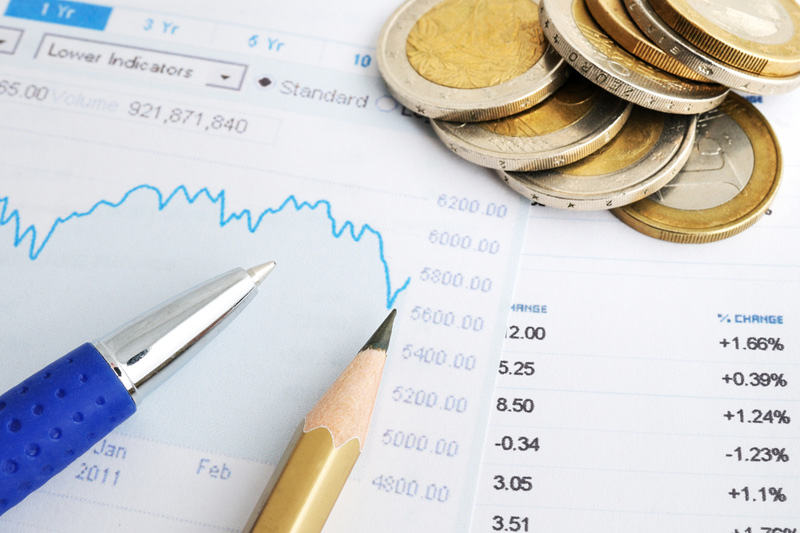
By Satoshi Sugiyama
TOKYO (Reuters) -Japan's economy avoided a technical recession, revised government data showed on Monday, even though the upward change in the fourth quarter was weaker than expected and highlighted concerns about the sluggish economic recovery.
Japan's revised gross domestic product (GDP) expanded at an annualised clip of 0.4% in the October-December period from the previous quarter, better than the initial estimate for a 0.4% contraction, according to the Cabinet Office.
It was, however, below economists' median forecast for a 1.1% uptick in a Reuters poll.
On a quarter-on-quarter basis, GDP grew 0.1%, compared with the initial reading of a drop of 0.1.% drop and a median forecast for a 0.3% rise.
"The headline is an upward revision, but domestic demand is remains lacklustre, particularly in consumption," said Saisuke Sakai, senior economist at Mizuho Research and Technologies.
The upward revision came amid growing market expectations the Bank of Japan could ditch its negative interest rates as early as this month, fuelled in part by board members' recent hawkish comments that Japan was moving towards the central bank's 2% inflation target.
Capital expenditure, which increased 2.0% quarter-on-quarter, anchored the upward revision. It was better than better than the preliminary 0.1% decrease but still below a median market forecast of a 2.5% rise.
Private consumption, which makes up about 60% of Japan's economy, fell 0.3% in October-December, slightly worse than the 0.2% drop in the initial estimate. Seafood and household appliances contributed to downward pressure in the category, a Cabinet Office official said.
External demand contributed 0.2 percentage points to real GDP, unchanged from the preliminary reading.
In the current January-March quarter, the Japanese economy could suffer contraction after factoring in slowdown in the Chinese economy, production halt at a unit of Toyota Motor (NYSE:TM) Corp and weak consumption, Sakai said.
LOOMING BOJ DECISION
Despite the pockets of weakness shown in the data, the BOJ will likely abandon the negative interest rates by next month citing a growing prospect of hefty pay hikes at annual wage talks with labour unions, said Marcel Thieliant, head of Asia-Pacific at Capital Economics.
"The Bank of Japan tends to put more emphasis on its own consumption activity index and doesn't seem to be particularly concerned about the recent sluggishness in activity," Thieliant said.
The BOJ is scheduled to hold a two-day policy-setting meeting on March 18-19.
Japan's largest trade union confederation, Rengo, has demanded pay rises of 5.85% this year, topping 5% for the first time in 30 years.
The Japanese central bank has long contended that robust wage growth was a prerequisite for rolling back more than a decade of a radical monetary experiment.
Japan last week saw inflation-adjusted real wages in January shrinking for the 22nd month in a row, while year-on-year household spending in the same month marked the biggest drop in 35 months.

By Yousef Saba and Maha El Dahan
DUBAI (Reuters) -Saudi Arabia's state-owned oil giant Aramco (TADAWUL:2222) boosted its dividend despite net profit falling 24.7% to $121.3 billion in 2023 on lower oil prices and volumes, showing the state's continued reliance on oil revenue as it seeks to diversify.
The profit, down from $161.1 billion in 2022, was still the company's second-highest on record, Aramco said on Sunday as it reported total dividends for the year of $97.8 billion, up 30%. Oil revenues made up 62% of total state revenues last year.
The Saudi government, which directly holds about 82.2% of Aramco, relies heavily on the oil giant's generous payouts, which also include royalties and taxes. The world's top oil exporter is spending billions of dollars trying to diversify its economy and find alternative sources of wealth having relied on oil for decades.
"Our balance sheet remains strong, even after our significant growth programme and dividend payouts," Chief Executive Amin Nasser said.
Nasser expects global oil demand for 2024 at 104 million barrels a day, up from an average of 102.4 million barrels in 2023.
The state's ambitious economic agenda, known as Vision 2030, is spearheaded by the sovereign Public Investment Fund, which owns 16% of Aramco, after a fresh transfer by the government of 8% to companies PIF owns last week.
Aramco declared a base dividend, paid regardless of results, of $20.3 billion for the fourth quarter. It expects to pay out $43.1 billion in performance-linked dividends this year, including $10.8 billion to be paid out in the first quarter.
The base dividend was increased 4% year on year, and the performance-linked dividend was about 9% higher.
The company said capital investments were at $49.7 billion in 2023, up from $38.8 billion in 2022. It forecast capital investments between $48 billion and $58 billion this year, growing until the middle of the decade.
That range is wide because for external investments, "there's an element of timing that we don't fully control," Chief Financial Officer Ziad Al-Murshed said on a media call.
The Saudi government in late January ordered Aramco to scrap its expansion plan to boost production capacity to 13 million barrels a day (mbpd), returning to the previous 12 mbpd target.
The capacity decision "is expected to reduce capital investment by approximately $40 billion between 2024 and 2028," Aramco said.
Most of the savings are expected in the latter years, so how it will be spent will be decided as opportunities arise, Al-Murshed said. Priorities for using the extra cash include sustaining capex, the base dividend, growth capex, additional distributions and further deleveraging, he added.
Free cash flow fell to $101.2 billion in 2023 from $148.5 billion in 2022.
Upstream investments including gas will be almost 60% of capex in 2024-2026, including external investments, Chief Executive Amin Nasser said. Downstream will be around 30% and "new energies" around 10%.
"As we go beyond that, over the next 10 years, upstream will be around 50%, downstream is around 35% and new energies around 15%," Nasser said.
Investing in gas will help free up more oil for export, as well as produce more liquids associated with gas extraction, he said.
Aramco's shares were up about 1.7% to 32.3 riyals a share, slightly above their 2019 IPO price of 32 riyals. Sources told Reuters last month that Saudi Arabia is poised to sell more shares of Aramco.
"That's a question for the government," Al-Murshed said on whether more government-owned shares would be sold.
($1 = 3.7505 riyals)
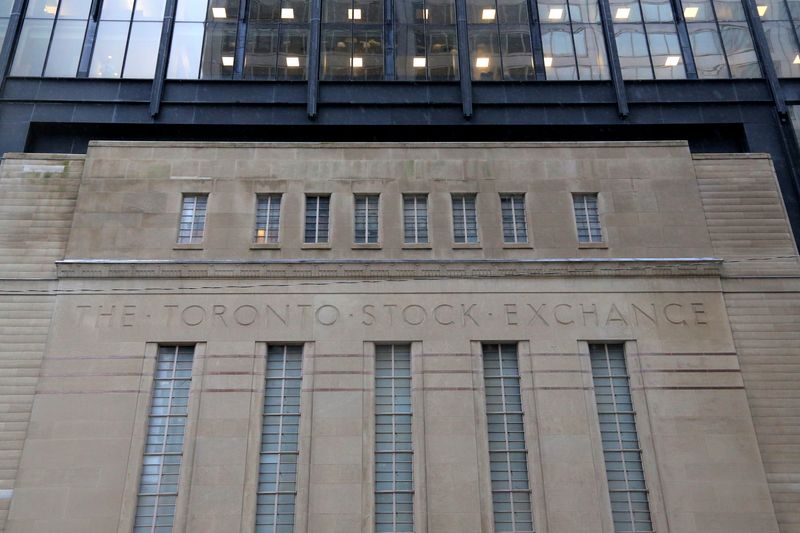
By Fergal Smith
(Reuters) -Canada's main stock index edged lower on Friday but still notched its fourth straight weekly gain as bigger-than-expected U.S. and Canadian jobs gains bolstered prospects of a soft economic landing.
The Toronto Stock Exchange's S&P/TSX composite index ended down 57.03 points, or 0.3%, at 21,737.53, after posting on Thursday its highest closing level in nearly two years.
For the week, the index was up 0.9%. The weekly winning steak was the longest since April 2023.
"The U.S. still seems very much on course for a soft landing. In Canada, it's a little bit more nuanced I think, but by all indications the market is holding up relatively well," said Elvis Picardo, a portfolio manager at Luft Financial, iA Private Wealth.
U.S. job growth accelerated in February, but that likely masks underlying softening labor market conditions as the unemployment rate increased to a two-year high of 3.9%.
Canada's economy added 40,700 jobs in February, double the expected gain but and wage growth slowed for a second consecutive month as the central bank continues to hold interest rates at a 22-year high.
The energy sector fell 0.7% as oil settled 1.2% lower at $78.01 a barrel and shares of uranium miners declined. Nexgen Energy Ltd lost 8.7% and Cameco Corp (TSX:CCO) was down 6.2%.
Consumer-related stocks also lost ground, with the consumer staples sector falling 1% and consumer discretionary ending 0.4% lower.
The materials index which includes precious and base metals miners and fertilizer companies, edged up 0.2% as gold added to its record-setting rally.
"Despite gold being at an all-time high, despite the geopolitical uncertainty, the resource sector which is a big driver hasn't really taken off. That's impeding the TSX's progress a little bit," Picardo said.
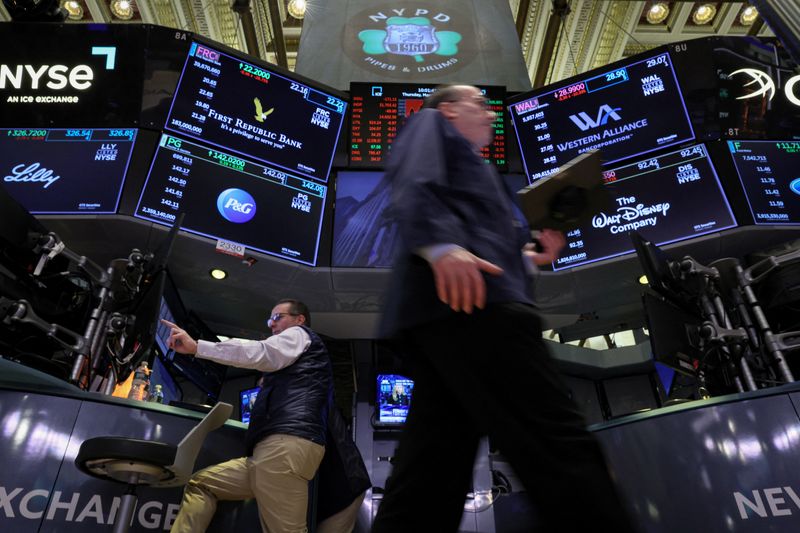
Investing.com – February data including consumer prices and retail sales will offer more cues on the prospects for potential Federal Reserve rate cuts. Bitcoin hits record highs, while Wall Street could be in for another volatile week. Here’s what you need to know to start your week.
US inflation data
Investors will be looking to Tuesday's U.S. inflation data as they try to gauge how soon the Fed could start cutting interest rates.
Economists are expecting February's consumer price index to rise 0.4% after a faster than expected increase of 0.3% in January.
On Thursday, Fed Chair Jerome Powell said it would likely be appropriate to cut rates “at some point this year,” but made it clear that he and his colleagues aren’t ready yet.
Market watchers will also be looking to Thursday’s retail sales data for February, which is expected to rebound 0.8% after falling the same amount a month earlier.
The economic calendar also features updates on industrial production, consumer sentiment and weekly data on initial jobless claims.
Fed officials will be entering the traditional blackout period ahead of their upcoming meeting next week.
Bitcoin boom
Bitcoin has hit a new all-time high above $70,000, boosted by investor demand for new U.S. spot bitcoin ETFs that launched this year and expectations for global interest rates to fall.
Billions of dollars have flowed into ETFs in the past few weeks, while the market has also been underpinned ahead of an expected upgrade to the ethereum blockchain platform, home to the second-largest digital ether, and a bitcoin "halving" event, which slows the flow of bitcoin minting, in April.
The previous bitcoin boom in 2021 was followed by a "crypto winter", when bankruptcies and collapses at the biggest crypto firms left millions of investors out of pocket, prompting regulators to step up warnings about the risks.
But this does not seem to have deterred a new wave of money from coming in. Crypto fans say the industry has matured, but central bankers and regulators are still wary. Now investors are wondering: how much bigger can it get and is it different this time?
Oil prices
Oil prices closed 1% lower on Friday and fell even more for the week as markets remained wary of soft Chinese demand even as producer group OPEC+ extended supply cuts.
Both benchmarks fell in the week, with Brent down 1.8% and Crude Oil WTI Futures losing 2.5%.
China last week set an economic growth target for 2024 of around 5%, which many analysts say is ambitious without much more stimulus.
On the supply side, OPEC+ members led by Saudi Arabia and Russia agreed last Sunday to extend voluntary oil output cuts of 2.2 million barrels per day into the second quarter, giving extra support to the market amid concerns over global growth and rising output outside the group.
Energy traders have also been focused on the timing of possible rate cuts by the Fed and the ECB. Lower interest rates could increase oil demand by boosting economic growth.
Stock market
Wall Street's three main indexes ended lower on Friday, closing out a turbulent week with artificial intelligence darling Nvidia (NASDAQ:NVDA) going into reverse after a recent rally.
For the week the S&P 500 lost 0.26% while Nasdaq fell 1.17% and the Dow Jones Industrial Average dropped 0.93%.
Nvidia ended Friday down more than 5% in its worst one-day performance since late May. Shares in the company still ended the week with gains of over 6% amid a rally that has added more than $1 trillion to its market cap so far this year.
Analysts say investors are locking in profits after the recent run higher in markets.
Given that the upcoming inflation data likely won’t be enough to reassure the Fed that price pressures are cooling quickly enough to warrant a near-term move market participants are likely to remain somewhat cautious.
UK jobs data
The UK is to release its latest jobs report on Tuesday, with investors and the Bank of England alike focusing on wage growth amid speculation over the timing of a first rate cut.
Average hourly pay decelerated to a rate of 6.2% in December, the slowest pace of growth in over a year, but not slow enough to convince BoE officials that interest rates - at 16-year highs - will need to come down sooner rather than later.
Meanwhile, the Eurozone is to release industrial production data for January. December’s report showed a large increase in production which erased a full year of declines. Another strong reading would be an encouraging sign for first quarter GDP growth.
--Reuters contributed to this report
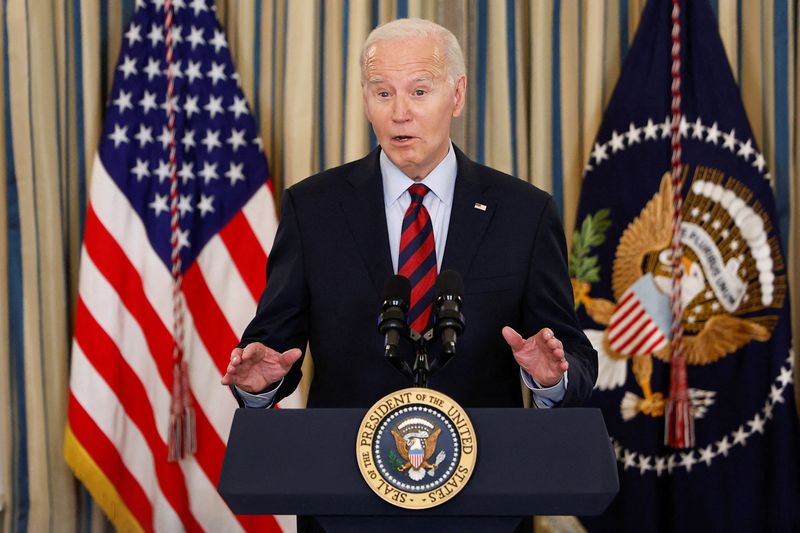
By David Lawder
WASHINGTON (Reuters) -U.S. President Joe Biden vowed Thursday to raise taxes on wealthy Americans and large companies, announcing plans in his State of the Union address to hike corporate minimum taxes and cut deductions for executive pay and corporate jets.
Biden previewed the steps that will be part of a proposed fiscal 2025 budget released next week that aims to decrease the federal deficit by $3 trillion over 10 years while cutting taxes for low-income Americans and aiding middle-class homebuyers.
He proposed a new tax credit that would help Americans buy first homes or trade up to larger ones by providing the equivalent of $400 per month for the next two years to offset high mortgage rates. Biden also called for the elimination of title insurance on refinancings of federally backed mortgages, a move that can save homeowners $1,000 or more.
The tax plans are expected to form a core part of the Democratic president's re-election campaign, contrasting with Republican candidate Donald Trump, who signed a 2017 law that slashed taxes on companies, the wealthy and many middle-class Americans.
"I'm a capitalist. You want to make a million, or millions of bucks? That's great. Just pay your fair share in taxes," Biden said, adding that the Trump-era tax cuts "exploded the federal deficit."
Most of Biden's tax proposals have little chance of enactment unless Democrats win strong majorities in both chambers of Congress in November, a sweep that polls suggest is unlikely.
In addition to previous calls to raise the corporate income tax rate to 28% from 21% currently, he called for an increase to "at least 21%" for the 15% corporate minimum tax that he won as part of 2022 clean energy legislation. The tax applies to firms reporting over $1 billion in profits.
Biden administration officials also told reporters he wants to quadruple the 1% tax on corporate stock buybacks approved in 2022.
TAX BREAK CURBS
Biden also urged Congress to approve far stricter limits on business income deductions for executive pay, limiting them to $1 million for any given employee.
Current law prohibits deductions on compensation for chief executive officers, chief financial officers and other key positions. White House officials said the new proposal would cover all employees paid more than $1 million, and raise more than $250 billion in new corporate tax revenue over 10 years.
Biden also called for Congress to go after business income deductions for the use of corporate jets, an area already targeted for audits by the Internal Revenue Service. This includes extending the depreciation period for corporate jets to seven years, the same as commercial aircraft, from five years currently, reducing annual deductions, an administration official said.
Biden renewed his call for a "billionaire tax" that would impose a 25% minimum tax on income for those Americans with wealth of more than $100 million, saying it would raise $500 billion over 10 years to help fund benefits such as child care and paid family leave.
The average American worker paid about a 25% tax rate in 2022, the OECD reported. Biden said the average tax rate for some 1,000 billionaires was 8.2%, adding: "No billionaire should pay a lower tax rate than a teacher, a sanitation worker, a nurse."
He pledged to extend Trump-era tax cuts for those earning under $400,000 and revive a COVID-era expansion of the Child Tax Credit and increase a tax credit for low-wage workers.
Biden's latest proposals drew a sharp rebuke from the U.S. Chamber of Commerce, which has made preserving the 2017 Republican tax cuts a top priority.
Biden's policies "would actually result in lower economic growth, fewer new business starts, less job creation, and fewer choices for American families," said Neil Bradley, the Chamber's chief policy officer.
But Chuck Marr, who heads tax policy at the left-leaning Center on Budget and Policy Priorities, said Biden's "course correction" would make the U.S. tax system fairer.
“President Biden's tax proposals recognize that the 2017 Trump tax law - as exemplified in the corporate tax rate cut - was skewed to the wealthy, expensive, and failed to deliver on its promises," Marr said.
FIGHTING 'JUNK FEES'
As consumers continue to face high prices, Biden also said his administration would continue to crack down on "price gouging" including "junk fees" added to stated prices, and smaller package sizes - the "shrinkflation" bemoaned on Monday by Sesame Street muppet Cookie Monster in an X social media post.
After a move this week to cap credit card late fees at $8, Biden said this would save Americans $20 billion and banks were "mad" about it.
"I'm not stopping there. My new administration is proposing rules on cable, travel, utilities, online ticket sellers, telling you the total price upfront. So there are no surprises. It matters," he added.

By Harshit Verma
(Reuters) - Gold prices were poised for their biggest weekly jump in five months on Friday, hovering near a historic high, as Federal Reserve Chair Jerome Powell's remarks cemented mid-year rate cut bets, ahead of a key jobs report later in the day.
Spot gold was little changed at $2,157.16 per ounce, as of 0350 GMT, hovering around a record peak of $2,164.09 hit in the previous session.
U.S. gold futures were flat at $2,164.40.
Spot prices have gained more than 3.5% so far this week, on track to log their biggest weekly percentage gain since mid-October, when the Israel-Hamas conflict first escalated. This will also be bullion's third straight weekly climb, if gains hold.
While a spur of short-term speculative activity primarily driven by CTAs (Commodity Trade Advisors) and algorithmic trading prompted the gold rally, it's very much this expectation of interest rate cuts in the not-too-distant future that's backing it, said Nikos Kavalis, managing director at Metals Focus.
Powell said that Fed was "not far" from gaining the confidence it needs in falling inflation to begin cutting rates, which he said are likely to happen in the coming months.
Traders are pricing in three to four quarter-point (25 bps) U.S. rate cuts, with a 75% chance for the first in June, as per LSEG's interest rate probability app.
Lower rates boost the appeal of non-yielding bullion.
Another factor on why gold has been so solidly supported in recent weeks is the rally in procyclical asset classes, particularly equities as investors seek to diversify their risk exposure, Kavalis said.
The dollar headed for its sharpest weekly drop of the year, making bullion less expensive for other currency holders. [USD/]
Market focus will be on key U.S. jobs data due at 1330 GMT.
Spot platinum fell 0.3% to $916.30 per ounce, silver fell 0.1% to $24.29, while palladium rose 0.5% to $1,039.17. All three metals were poised for a weekly gain.

